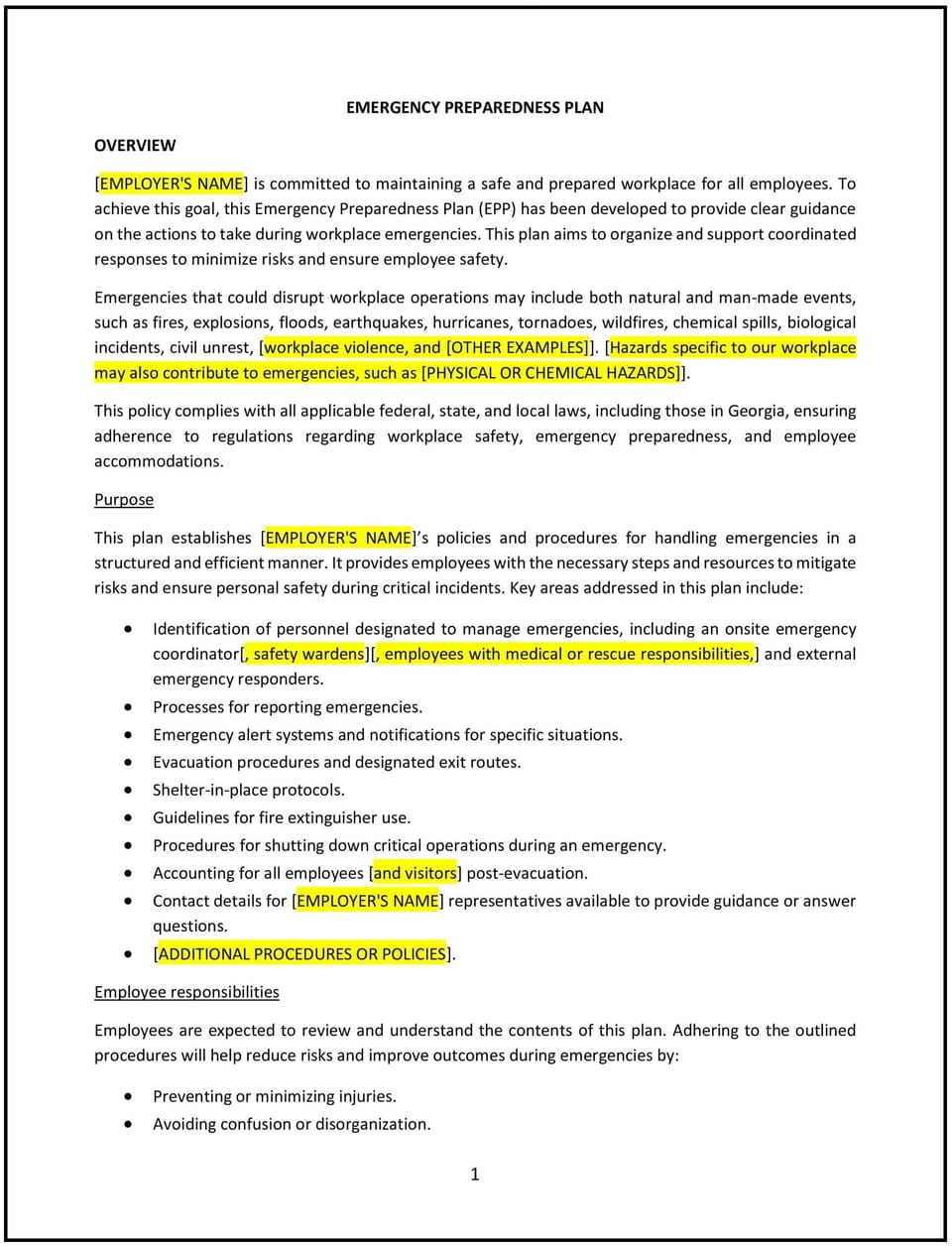Emergency preparedness plan (Georgia): Free template

Emergency preparedness plan (Georgia)
This emergency preparedness plan is designed to help Georgia businesses create strategies to respond effectively to emergencies, such as natural disasters, workplace accidents, or other unexpected events. The policy outlines procedures for ensuring employee safety, minimizing disruptions, and recovering operations efficiently.
By implementing this plan, businesses can promote resilience, safeguard employees, and maintain business continuity during emergencies.
How to use this emergency preparedness plan (Georgia)
- Identify potential risks: Assess the types of emergencies that could impact your business in Georgia, such as hurricanes, flooding, severe storms, or fires.
- Develop an emergency response team: Assign roles and responsibilities to specific employees who will coordinate and manage emergency responses.
- Create evacuation procedures: Outline step-by-step instructions for evacuating the workplace, including designated exits, assembly points, and routes.
- Establish communication protocols: Define methods for notifying employees, emergency services, and stakeholders during an emergency, such as through emails, texts, or loudspeakers.
- Provide training: Offer regular training and drills to familiarize employees with emergency procedures and ensure readiness.
- Prepare emergency supplies: Maintain accessible supplies such as first aid kits, flashlights, and water to support employees during an emergency.
- Include recovery strategies: Develop a plan for resuming operations after an emergency, including contacting vendors, assessing damages, and ensuring employee support.
- Review and update regularly: Periodically review the plan to reflect changes in Georgia laws, workplace dynamics, or potential risks.
Benefits of using this emergency preparedness plan (Georgia)
Implementing this plan provides several advantages for Georgia businesses:
- Enhances employee safety: Clear procedures help protect employees during emergencies.
- Reduces downtime: Effective planning minimizes disruptions and speeds up recovery efforts.
- Promotes organizational resilience: Businesses are better prepared to handle crises and adapt to changing circumstances.
- Strengthens trust: Employees and stakeholders feel reassured knowing the business prioritizes safety and continuity.
- Reflects Georgia-specific considerations: Tailoring the plan to local risks, such as hurricanes or tornadoes, ensures relevance and effectiveness.
Tips for using this emergency preparedness plan (Georgia)
- Communicate the plan: Share the plan with all employees and provide clear instructions for accessing it during emergencies.
- Test the plan: Conduct regular drills and simulations to ensure employees are familiar with their roles and the procedures.
- Collaborate with local authorities: Work with Georgia-based emergency services and organizations to align your plan with community resources and support.
- Keep contact lists updated: Maintain an up-to-date list of emergency contacts, including employees, local authorities, and key vendors.
- Adapt to feedback: Incorporate lessons learned from drills or past emergencies to improve the plan continuously.
Q: What types of emergencies should businesses prepare for in Georgia?
A: Businesses should prepare for risks common in Georgia, such as hurricanes, tornadoes, flooding, fires, and workplace accidents.
Q: How often should employees be trained on the emergency preparedness plan?
A: Employees should receive training at least annually and participate in regular drills to maintain readiness.
Q: What should an emergency response team do during a crisis?
A: The team should coordinate evacuations, communicate with employees and emergency services, and oversee the implementation of the emergency plan.
Q: How can businesses communicate effectively during an emergency?
A: Businesses should use multiple channels, such as emails, texts, or loudspeakers, to ensure timely and clear communication.
Q: What supplies should be included in an emergency kit?
A: Emergency kits should include first aid supplies, flashlights, batteries, water, non-perishable food, and any necessary medications.
Q: How can businesses ensure continuity after an emergency?
A: Businesses should develop recovery strategies, such as contacting vendors, assessing damages, and supporting employees, to resume operations quickly.
Q: How often should this plan be reviewed?
A: The plan should be reviewed annually or whenever there are significant changes in Georgia’s risks, workplace conditions, or legal requirements.
This article contains general legal information and does not contain legal advice. Cobrief is not a law firm or a substitute for an attorney or law firm. The law is complex and changes often. For legal advice, please ask a lawyer.


